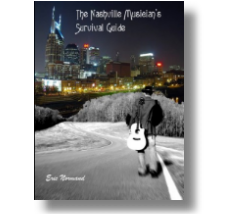
It was a warm Wednesday night in July of 2007 when the Rhett Akins tour left Nashville, Tennessee, bound for Macon, Georgia, on what would be a four city run across the deep South. The bus, a still shiny and new looking 2005 Prevost XLII, wreaked of personality, while the driver, Les, was somewhat reserved and looked a bit less than shiny and new. As is typical in the world of one-off bus leasing, this would be our first and only trip with this driver, and although he seemed to drive okay, we knew almost nothing about him. Well, over the next four days we would 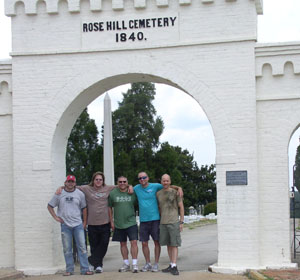 learn everything we needed to know about ‘Mr. personality’.
learn everything we needed to know about ‘Mr. personality’.
The six-hour ride to Macon was uneventful enough, and I didn’t even wake up when we pulled into the Ramada Inn parking lot. The rest of the day went pretty smoothly, and we even managed to fit in a visit to the infamous ‘Rose Hill Cemetary’, the Allman Brothers early stomping ground and eventual resting place of Duane Allman and Berry Oakley. Our show at the Cox Capitol Theatre later that night went well, after which we taxied the bus back to the hotel to sleep over as our next destination, Thomaston, Georgia, was only 50 miles away.
We left Macon at 11:00 AM on Friday morning for the one-hour trip to the small town of Thomaston, Georgia, eventually landing in front of ‘Q’s Downtown Grill and Music Hall’, and had a little down time between our arrival and load-in. Most of us were hanging in the front lounge when Les began his first in a series of rude and inconsiderate commentaries. “I was just offered an $85,000 a year driving job, but I think I’m going to turn it down” he boasted. “Why? That sounds like a great gig” one of us asked. “I usually make a lot more than that. Last year, I made $120,000” he continued in an annoying offhand manner. “What an asshole!” we all thought. We all knew that bus drivers make a ton of money but didn’t need to be reminded just how much more they make then the rest of us.
A short while later we sent Les off to his hotel room for sleep and went about our day. Rightafter load-in the wind picked up outside and it began to pour. Some severe weather had moved in and the power was knocked out for a while. We later learned that a tornado had touchdown a couple of miles away, but fortunately the weather passed, the power came back on, and we continued about our day. We played our show that night to a packed house, loaded out, and enjoyed some late night partying on the bus while we waited for our driver. As luck would have it, the runner was late picking up Les, who apparently had to wait in the hotel lobby for about 45 minutes. So by the time Les arrived back to the bus, he was somewhat agitated and had a hard time concealing this.
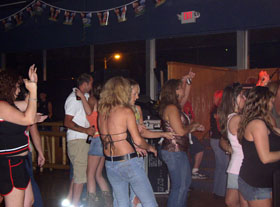 Sometime around 3 AM we began the 7 Hour drive to Augusta, Georgia, although now, the quality of the drive was noticeably rougher. Other than some hard braking at a few points, we assumed that the rough ride was just due to some poor road conditions across that part of the state. By the time we pulled into ‘The Country Club’, the happening nightspot in which we would be performing on this Friday night, a red carpet had been laid out for our arrival. Band and crew quickly attacked a huge platter of chicken fingers, shrimp cocktail, and a veggie plate that had been set out for us in the green room.
Sometime around 3 AM we began the 7 Hour drive to Augusta, Georgia, although now, the quality of the drive was noticeably rougher. Other than some hard braking at a few points, we assumed that the rough ride was just due to some poor road conditions across that part of the state. By the time we pulled into ‘The Country Club’, the happening nightspot in which we would be performing on this Friday night, a red carpet had been laid out for our arrival. Band and crew quickly attacked a huge platter of chicken fingers, shrimp cocktail, and a veggie plate that had been set out for us in the green room.
We sent Les off to his room, loaded in, and sound checked. This was of course followed by dinner, hotel time, and a blistering performance to a packed house of 1000 plus concertgoers and parties. The crowd was overly enthusiastic on this hot summer night and the party spilled out into the parking lot after the show. By the time Les returned around 2 AM the front lounge of the bus was full of nightclub patrons and in full ‘K-tel dance party’ mode. There was also 30 or 40 people hanging out in the parking lot near the bus, and this is where Les delivered his next uncanny remark. “Does Rhett party like this every night?” he said judgingly. “Every night’s different, sometimes we party a little bit, other times we’re tired and go to bed. Why do you care?” I answered, now annoyed with this would-be high school prom chaperone. “It just seems pretty irresponsible to me. Not a good way to run a business.” he grumbled.
About an hour later we set sail for Myrtle Beach, South Carolina, the final stop of this five legged bus ride that was getting rougher every minute. Apparently annoyed by our after show activities,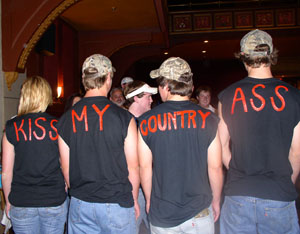 Les tossed us around pretty good for the five hour trip, perhaps as some sort of punishment for having “too much fun”. A lot of side to side sway, hard braking, you know, the kind of bus driver tendencies typical of a moron. We pulled into the parking lot of ‘The Boathouse’ which was the venue we would be playing, and this time I was instantly awoken as the bus jerked to a quick, hard stop. A little while later I sent Les off to his room at the adjacent Holiday Inn, notifying him that we planned to depart for home at 11 PM that night.
Les tossed us around pretty good for the five hour trip, perhaps as some sort of punishment for having “too much fun”. A lot of side to side sway, hard braking, you know, the kind of bus driver tendencies typical of a moron. We pulled into the parking lot of ‘The Boathouse’ which was the venue we would be playing, and this time I was instantly awoken as the bus jerked to a quick, hard stop. A little while later I sent Les off to his room at the adjacent Holiday Inn, notifying him that we planned to depart for home at 11 PM that night.
Saturday proved to be another great outing for Rhett and band, an outdoor summertime concert behind a nightclub on the banks of a river. Again, the day’s activities and concert went quite well, with the biggest drama being delivered by our wing-nut bus driver at the end of the night. Our show had ended at 9:30 and we were all hanging out inside the bar waiting for the 11:00 PM bus call. Around 10 of, I walked out to the bus to see if Les was ready. Upon opening the bus door I was astonished to see him sitting in the driver’s seat smoking a cigarette (In case you’ve never ridden on a tour bus, in general, this is a no-no). Smoking on our busses is only permitted while the bus is in motion, as this will allow the smoke to ventilate out an open window. I asked him to not smoke on the bus while not moving, and he reluctantly extinguished his cigarette.
I told him I would go get the rest of the guys and that we could leave shortly. Upon returning to the bar I quickly realized a couple of the guys must’ve gone over to the hotel, and called them to tell them we were ready to leave. When I returned to the parking lot I was dumbfounded to see the tail lights of our bus growing smaller in the distance as Les was apparently more than ready to be done with us. When I called him on my cell phone and asked “What are you doing?” he sarcastically answered “Are you ready to go yet?”. “Well yeah, I was just rounding up the guys. I told everyone were about to leave, and next thing I know I’ve got guys running after the bus across the parking lot carrying 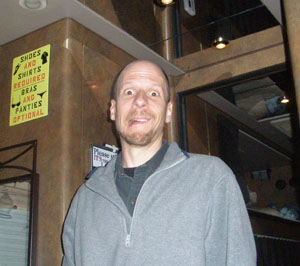 suitcases. What the hell are you doing?” “All right, I’m coming back now.” He said in a cocky tone of voice, almost as if this was some sort of weird game of bus driver/tour manager chicken.
suitcases. What the hell are you doing?” “All right, I’m coming back now.” He said in a cocky tone of voice, almost as if this was some sort of weird game of bus driver/tour manager chicken.
He brought the bus back, we hopped on, and took off down the highway, more than ready to be done with this jack-off. About an hour Into the drive, our drummer, Cliff, informed me that he had left his suitcase back at the hotel. I was horrified. I was already at a breaking point with this driver, and it seemed like he hated driving us. This is the last thing I wanted to do, but I had to do it. “Hey Les, I hate to tell you this, but Cliff left his luggage back at the hotel and we need to go back and get it.” After muttering some sort of offhand comment under his breath, he literally locked up the brakes, sending people flying as bottles fell off the counter and smashed on the floor. Again, I was dumbfounded. “What the hell you doing? He didn’t forget his bag on purpose. We want to be done with this trip just as badly as you do. Do you really think we want to spend an extra two hours on this bus with you?” I unleashed.
“Sorry about that. I didn’t mean to hit the brakes that hard.” he said. I then added “So far on this trip, each night your driving has gotten rougher and rougher. We don’t care about making good time on these trips, we want a smooth ride so we can sleep. Do you think you can lose the attitude just long enough for that to happen?”
With that, he turned around, went back for Cliff’s bag, and then began the 600 mile trip home two hours later, and for the second time. I guess the only satisfaction we got out of this was the knowledge that we made the final leg of the trip two hours longer than necessary for “les the mess’.
I’ve been on a lot of buses, with a lot of different drivers, but this particular trip was a first. Never, and I mean never, have I had a driver just drive a waiting tour bus off into the night without telling somebody. Never have I seen one smoke a cigarette in the driver’s seat while the bus was parked. Never have I had a driver question our organization, or our right to party after the show. But then again, never had I ever experienced the exceptional bus driving skills of ‘Les the wing-nut’.
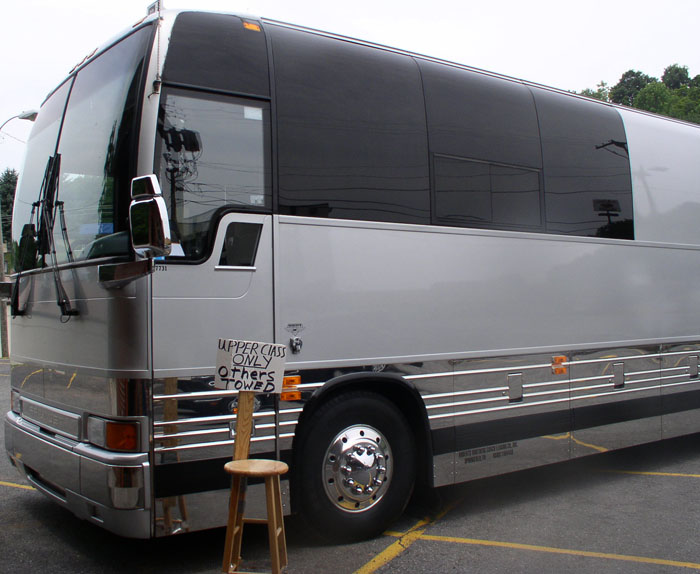
So you just moved to Nashville, you’re a good solid player with a good attitude and excited to begin working. You don’t care about being a superstar, you just want to play music with others but you are quickly learning that this can be hard to do. You are having a hard time getting off the ground. What do you have to do to get started in this town?
Regardless of your talent level, the truth is simply that talent alone isn’t going to get you work. Nashville, like any major music Metropolis, attracts talented people by the masses. They literally flock to this place in droves. This creates a supply and demand problem that works against the musicians. Knowing and understanding this is crucial. Ultimately, the only way in is by slowly nurturing relationships that will lead to opportunities. The best place to build these relationships is in the nightclubs around town. There is no shortcut to this, it’s going to take some time so be patient.
A newcomer to Nashville recently told me his story. He moved to Nashville about a year ago with the goal of becoming a part of the country music scene here. He has been frequenting the clubs downtown with the intention of sitting in and getting to know some of the players. Even though he’s familiar with most of the standards that are being played, he’s having a hard time getting past the idea of hustling to sit in. He said that he views his reasons for networking as self-serving, and this prevents him from talking to musicians because he feels self-conscious about it – like he’s using them. The end result is that he just walks around watching bands, never talks to anybody, and then goes home.
I, as well as many others, can relate. When I first moved to Nashville I was in a similar situation. How does one introduce them self to all these total strangers and maneuver his or her way into sitting in without coming off to self-serving?
One thing that worked for me was seeking out groups of players and artists that I related to musically. This makes it much easier to form real relationships that can evolve over time. Try to find a group of players, or singer that you really connect with. Maybe you really dig their song list, or are inspired by the performances of one or more of the players in the band. If you can feel a real connection through the music, it should be easy to engage in some genuine conversations – the music is your common ground. Find out when they’re playing again and become a regular. Over time they’ll gradually get to know you and sitting in will be part of a natural progression. Maybe try to cultivate a handful of different situations like this. Also, try to find these kinds of inspiring groups that are playing either earlier shifts and/or at the less popular bars. Those situations will be more laid back and might make it more likely for them to take breaks. And that combined with a smaller crowd in general will make it easier to engage in conversation.
The key to gigging in Nashville is relationships. It’s hard to force friendships and relationships to happen, they need to naturally evolve. You need to regularly put yourself in different kinds of situations where this can happen. It just takes time, persistence, and patience. Most importantly, be a good person. Of course being proficient on your axe will help to.
There is no guarantee that this approach will allow you to achieve the kind of success you envision. But for that matter, there are no guarantees in the music business, or life in general. So just suck it up, be in it for the long haul, and get out there and start pounding the pavement. Be friendly and outgoing and put your best foot forward. Talk to people. Take an interest in their careers and lives. Try to find some common ground and build relationships with players that you relate to. If you have already tried this and haven’t yielded much results, try harder.
That’s what it takes to get started in Nashville.
Multi-band shows on any level, be it a national act with a local opener in a concert hall, a battle of the bands at a local high school, or the Bonnaroo Festival, can be a great musical experience for both the performers, and audience. They can also be a logistical nightmare for event organizers, production companies, crew members, and the musicians. The key to these kinds of events running smoothly is highly organized and coordinated advanced planning and an overall spirit of teamwork.
Typically, the most well run multi-band shows have a designated stage manager, usually hired by the event, the production company, or the headlining act. In the days and weeks prior to the event, the stage manager will coordinate between the event buyer, the production company, local crew, and the tour managers of the bands and artists involved. In a perfect world, the proper planning and effort will result in a painless day of load-ins and load-outs, sound checks, line checks, and performances, all happening glitch free and on-time. Unfortunately, we don’t live in a perfect world.
Some of the problems that can arise might range from performers and equipment arriving late, bad weather, equipment problems, a shortage of stagehands, ineffective communication, and often, just poor planning. I was recently involved in a show that suffered from literally all of these problems.
At any multi-band show, especially on a national level, there are some unspoken rules and protocols that come into play. If the event has hired a national act, they probably signed a contract and agreed to the terms of that acts rider. Usually these riders will provide very specific guidelines regarding all of the details pertaining to the daily activities and performance requirements of that artist or band. In many situations, it also gives the artist and tour manager final say regarding opening acts, set lengths, backstage traffic, etc. All of this must be mutually agreeable in advance, but after both parties have signed off on the rider, each will have specific responsibilities and expectations. In short, the tour manager of the headlining act and the event buyer will have complete authority over the performance related events of a given show day.
If there is more than one national act, the other acts tour managers will also have a big say, but all in accordance to each acts specific rider and the agreements made when the show was advanced. This is where it can get a little grey as some artists riders might conflict with another’s. In these situations an unspoken rule comes into play, that being that the headliner has the ultimate say, followed by the artist with the second billing, followed by third billing, etc. if there are two or more acts that each receive equal billing (co-headliners), there is usually a mutual decision making between tour managers and the event buyer. The lines can become greatly blurred on a smaller scale, such as local bands performing together in a nightclub, or regional festivals, as these situations seldom have signed contracts.
Regardless of a given events level of profile, or organizational efficiency, being a team player is of utmost importance for all involved, especially the musicians.
On a recent Rhett Akins show I worked, we were co-headlining with another national artist, Ashton Shepherd. Several days prior to the show, the events stage manager contacted me and asked if our drummer would be willing to use Ashton’s drummers kit, both to save time, and much-needed stage space. After checking with our drummer, I agreed to this request, as did the band scheduled to play before us, Matt Stillwell. The event had four bands total, and the first band scheduled to play, a regional act, would be setting up their drums in front of the other drum kit. The sound checks were scheduled to take place in reverse order of the performances, and would be starting at 1:00 PM on the day of show for a 4:00 PM showtime. Sounds simple enough, right?
Not. The first thing to throw the schedule off was bad weather, as it rained in the morning pushing back the production set up. Ashton’s band began their set up at 2:00, and it was understood and accepted that the show would probably not start on time. About a half-hour into their set up, I walked out to the stage to discover the openers enormous eight piece drum kit being constructed in the middle of the undersized stage. When I asked the drum tech why he was setting up these drums before the other bands had sound checked, he replied “The stage manager said I have to have these setup by 4:00 no matter what.” I told him that the stage manager was wrong to request this, as there was simply not enough space on the tiny stage for three other bands to set up their backline and sound check. This resulted in a big argument between me and the unyielding drum tech, which resulted in another big argument with the stage manager.
The stage manager didn’t want to budge on his decision, despite the fact that he had discussed none of this with me in advance. Of course he was wrong in his actions, as this kind of decision-making was a complete breach of our rider, in addition to being just plain stupid. So rather than continue with the stalemate, I suggested asking Ashton’s drummer, Brian, if he would be willing to share the use of his kit with one more band. Brian agreed, asking simply that the positioning of his drums not be altered, a request that both Rhett and Matt Stillwell’s drummers had both previously agreed to. Perfect. Problem solved, right?
Nope. When the openers drummer was presented with this option, he said “I can’t play these drums without moving them. I need to change a few things. The height of the symbols, the height and angle of the toms, I need to move the hi hat cymbal stand so I can replace your kick pedal with my double kick pedal.” The look on Brian’s face was that of “you’ve got some nerve, kid”, but in the spirit of making this all work out, he agreed to let this unenlightened fellow make some of these changes.
In the end, it all worked out. The show started late, but all four bands play their shows to an enthusiastic crowd. This story underscores a few great points. Ashton’s drummer presented a grand gesture of goodwill will by offering to share the use of his drum kit. This is not expected in these kinds of situations, and is actually quite rare, but when it is offered, it’s another unspoken rule to simply not move the positioning of the drums, especially when specifically requested. His initial generosity, and his willingness to budge on his own principles for the common good, exemplify the meaning of the phrase ‘team player’. On the contrary, the opening band’s drummer and his tech acted in poor taste. They created an unnecessary tension between musicians and crew members and “took” something that was not offered. They created a feeling of ill will. They were essentially, a stick in the mud.
Every event contains two drastically different groups of people. The people that go to the show, and the people that are working the show. If you’re part of a band and performing at an event that has multiple bands, try to think of yourself as part of a team. A team of musicians, stagehands, crew members, and event staff all working together to present one great day or night of musical performances. You’re all on the same team, and need to work in harmony. You need to watch each other’s backs, protect each other’s gear, and work in a spirit of cooperation, not competition. No matter where you fall in the pecking order, being a team player and working towards the common good of all involved is ultimately what makes a great show. And being organized doesn’t hurt either.
Over the past 20 years or so, there have been many powerful innovations in the world of communications, and I often wonder if these changes have hindered society as much as they have helped it. The Internet, e-mail, cell phones, Facebook, texting, these things are supposed to make our lives easier and help people become more connected with each other, but do they really? When I look back to my life as a teenager growing up in rural New Hampshire in the 1980s, I see a world so far removed from the world of today, that images come to mind of my great grandparents living in the era just before the streetcar. Let’s take a look back, shall we?
The year is 1983 and I’m a 15-year-old sophomore getting ready for school. Just before heading out the door, I call one of my friends on a telephone that still has a cord on it. The line is busy, and there is no call waiting. Oh well, I guess I’ll just talk to him later, it wasn’t that important anyway (this will be the last opportunity to use a telephone for the next eight hours). Throughout the school day, the only conversations that take place are in between class and at lunch, for the most part. There are no constant distractions from texts or endless phone apps on my iPhone, because they doesn’t exist yet. With nothing else going on, I guess I’ll have to somewhat pay attention. During study hall, I take a few minutes to write a letter, with a pen and paper, to a friend who moved away. A Little later on, I’m home from school and flipping through the pages of an Encyclopedia Britannica for a homework assignment. I can’t just punch a word or phrase into a Google search for the answer, I have to pick out the right volume, think about the spelling of the word that I’m looking up, find it in its alphabetical place in the book, read about the subject to learn the answers, and then complete my assignment with a pen and paper.
Homework now done and I’m off to my part-time job as a dishwasher at a local restaurant. Without a cell phone, I can’t be reached easily at work, but then again, why should I be, I’m  supposed to be working. On the rare occasion that there might be a family emergency, I can be reached on the restaurants business phone, but as that phone line is for the restaurants business, outside conversations from the workplace are an exception, not the rule. This leaves not much else to do but work, and engage in friendly conversations with my coworkers. I get home from work and there is a voice mail on the telephone answering machine. The message is from one of my friends about getting together on the weekend. As this is before the era when everyone walks around with a cell phone glued to their hand, it is the only message. Telephone communication was not so constant, as you had to be somewhere with a landline to speak on a telephone. This extra effort usually resulted in most people only leaving messages for things that were actually important. Jump ahead a couple of months to summer vacation and my dad has sent me to the local hardware store to buy some new hinges for a broken barn door. I talk to the owner of this small store, a store that, amazingly, always seemed to have at least one of anything you would ever need. The store owner not only produces the appropriate items, he explains some do’s and don’ts about correctly installing these items.
supposed to be working. On the rare occasion that there might be a family emergency, I can be reached on the restaurants business phone, but as that phone line is for the restaurants business, outside conversations from the workplace are an exception, not the rule. This leaves not much else to do but work, and engage in friendly conversations with my coworkers. I get home from work and there is a voice mail on the telephone answering machine. The message is from one of my friends about getting together on the weekend. As this is before the era when everyone walks around with a cell phone glued to their hand, it is the only message. Telephone communication was not so constant, as you had to be somewhere with a landline to speak on a telephone. This extra effort usually resulted in most people only leaving messages for things that were actually important. Jump ahead a couple of months to summer vacation and my dad has sent me to the local hardware store to buy some new hinges for a broken barn door. I talk to the owner of this small store, a store that, amazingly, always seemed to have at least one of anything you would ever need. The store owner not only produces the appropriate items, he explains some do’s and don’ts about correctly installing these items.
That was life in the pre-digital era. Conversations were voice to voice, either in the room, or by telephone. Applications for jobs or bank loans were also done with a face-to-face meeting, and you couldn’t tell someone you were firing them in an e-mail. If you wanted to learn something, you had to make a real effort, either by talking to an expert, looking something up in the family Encyclopedia, or even venturing out to the local library. People weren’t so easily distracted by advertising as there wasn’t yet a television or electronic billboard placed strategically throughout the day. Human interaction was more direct and personal. People communicated with their family, friends, and peers almost solely through the human voice. The very nature of this simpler and more direct existence also made it difficult for people to avoid honoring their commitments.
Flash forward to 2010. While some of us still occasionally use some old-school methods for communicating (like the phone), it is almost impossible to escape texting and e-mailing in our everyday lives, methods of communication that rely on the perception of the reader, limit the depths of our interactions, and only contain fragments of the human element we once took for granted in our daily conversations. Many choose, or are forced to live their social lives through Facebook and other social networking sites, where thoughts are amputated at 140 characters and we never actually “speak” to anyone. We are so pressed for time in this hyperactive world and our lives are often so fragmented, that we will Google the answer to a question, rather than learn the entirety of a subject. We will text or e-mail a coworker or family member from the next room, or watch television in school on a screen smaller than the size of our hand. The very  nature of the Internet allows a veil of anonymity for many, and I believe that the downside of all this technology is perpetuating a certain degree of social ineptitude, and at times, a lesser degree of intelligence for some.
nature of the Internet allows a veil of anonymity for many, and I believe that the downside of all this technology is perpetuating a certain degree of social ineptitude, and at times, a lesser degree of intelligence for some.
Of course there are some positive sides to all this technology. Research has become more practical and efficient for the masses, it’s easier now than ever to connect with lost family members, friends, and peers, and wrongdoers have a harder time hiding behind their actions, to name a few. But with all these advancements comes responsibility. How do we as a society use the good that this technology has to offer without losing our basic humanness along the way? Are we really as smart and connected as we think we are?
A friend of mine recently said that his grandfather is always telling him that technology is the drug of today’s younger generation. I think I’ll twitter him to let him know I just posted this blog.
Yesterday I learned a valuable lesson. If you have something to say to someone important in your life, perhaps texting isn’t the best way to do it. I just learned this the hard way. I made the mistake of complaining to my boss about an issue that wasn’t really that significant through a short text. He perceived my three sentences in a way I had not intended, and before I could explain my thoughts further, he reacted harshly. We went back and forth in texting world for a little while, but it was well into the next day before things calmed down. The human voice, whether in person, or over the phone, can give different meaning to the simplest words and phrases. Those same words and phrases appearing on a screen can have several different meanings, depending on how the reader interprets them.
I grew up in the 80’s and 90’s, when most human interaction was done through telephone calls, face-to-face meetings, or handwritten letters. If you needed to communicate with someone, typically, a real conversation would take place. Now, most people I know prefer to communicate via texting or e-mail. For me, texting is great if you have a simple question for someone that requires a yes or no answer. But if it involves anything that’s dynamic or complicated, intricate details are often hard to convey in 140 characters or less. I can’t even think of how many times I’ve had long winded “conversations” with someone who is important in my life, texting back and forth for 20 or 30 minutes, or sometimes more. I often wonder, why didn’t we just talk on the phone? This would have been a five-minute phone call. Sometimes in the middle of those situations, I’ve tried to call the other party, and they didn’t answer, but they do answer the texts. Why are we afraid of direct human interaction? I know there’s no going back, and texting is here for good. But I think that next time I have something important to say to my boss, or anyone else important in my life, if there’s any question about how my message will be perceived, I’ll wait until I can do it in person, or at least in a real conversation.
